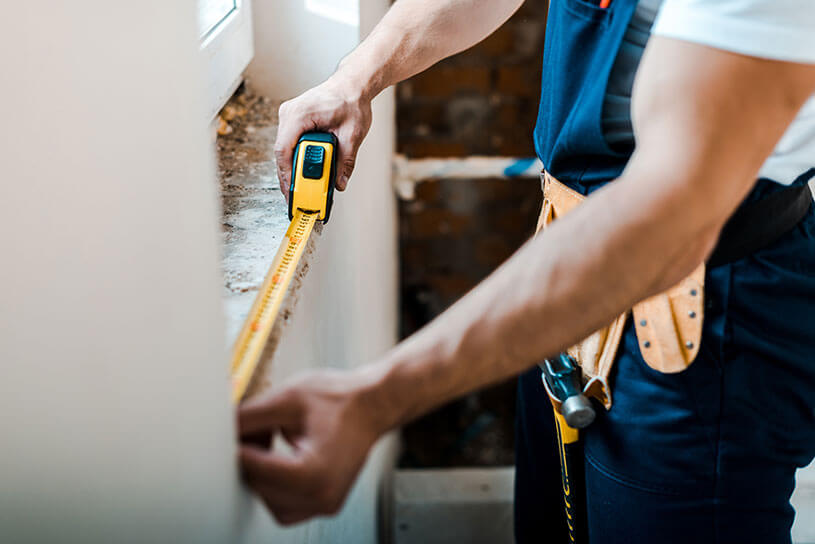Becoming a self-employed handyman can turn your skills into a job that pays – plus, you can enjoy all the benefits of working for yourself.
Ready to take the leap and become a self-employed handyman in the UK? Read on for our comprehensive how-to guide.
What does a handyman’s job involve?
If you’re starting from scratch, you might be wondering what handymen do. Handymen have varied work lives, and no two days are the same.
Your responsibilities will differ depending on whether you’re working in domestic or business environments, but some of your key responsibilities are likely to include:
- Basic rewiring, changing bulbs, and changing fuses
- Maintaining and repairing fixtures and fittings
- Painting and decorating
- Clearing areas of waste, foliage, and other items
- Moving or assembling furniture or equipment
- Basic plumbing jobs
- Basic gardening maintenance or landscaping
What does a handyman earn?
Handymen who work as employees can generally expect to earn between £18,000 and £25,000 a year. However, as a self-employed handyman you’ll set your own rates. The going hourly rate for this kind of work varies widely.
PayScale places the average hourly rate for a handyman at around £10. Yet Skilled Handyman, for example, charges £65 plus VAT an hour, and Handyman Hero’s services cost £50 for the first hour and £40 for any subsequent hours.
As a self-employed worker, you’ll also have more options for career progression. For example, you might choose to specialise in a specific area, and set up a business offering those services – perfecting a niche can be a good way to win clients and repeat business. Eventually, you might take on employees as your business expands.
Step-by-step guide to becoming a handyman
So, now you know what a handyman’s job entails and how much a handyman earns, you may be ready to take the leap and start out on your own.
1. What skills and qualifications does a handyman need?
There’s no formal training required to be a handyman, although there are some training courses that you might choose to do to get yourself up to speed. City & Guilds, BTEC, and NVQ qualifications in related fields are all available.
Whether or not you have formal training, you’ll need a wide range of skills, and these will vary depending on the environments you work in. For example, you may need different skills if you’re working in domestic as opposed to industrial settings. You should have some basic electrical skills, and some familiarity with minor plumbing jobs. You’ll also need to be handy with a paintbrush and roller.
Importantly, you’ll need to be physically strong, as handyman jobs generally require a relatively high degree of physical exertion.
2. What supplies does a handyman need?
Again, the supplies and equipment you’ll need as a handyman will vary depending on the type of work you’re doing. However, the following should get you off to a good start:
- A toolbox containing basic hand tools such as hammers, wrenches, screwdrivers, and so on
- Cordless drill with various drill bits
- Sanders and planers
- Vacuum
- Saws, both electric and manual
- Step ladders
- Painting supplies, including brushes, rollers, trays, and cleaning materials
- Long extension cables
- Buckets and storage bins
3. The legal side
As a self-employed person, you have a number of legal requirements you should sort before you start trading. It’s likely that you’ll start out as a sole trader, but you can read about choosing a legal structure for your business here.
You’ll need to register as self-employed with HMRC. You’ll need to file your tax return and pay your bill according to the UK tax deadlines.
It’s important that you budget for your tax bill, remembering the annual payment on account too. Read what to do if you can’t pay your tax bill.
4. Get insured
It’s also important that handymen think about insurance. No matter how careful you are, mistakes can happen – and one mistake can be financially devastating. Tailored insurance can help make sure you’re protected.
- Public liability insurance is a key cover for handymen. It can protect you in the event of injury or loss suffered by a member of the public as a result of your business
- You may also consider personal accident insurance, which can cover medical costs and loss of income after suffering an injury
- Tool insurance is also important for protecting the equipment you use every day – if your tools were lost or stolen, it can help you can back on your feet quickly
Simply Business offers insurance tailored specifically to handymen. It’s quick and easy to purchase your policy, combining the covers you need for your business. Compare handyman insurance quotes today.
5. Find customers for your handyman business
Now that you’re all set up, it’s time to find some customers! You can start local – this could be as simple as putting up cards in nearby shops, but you could also think about advertising in local publications.
Digital marketing is becoming increasingly important for all tradesmen, including handymen. There’s a range of sites where you can list yourself and bid for jobs in your local area, perhaps the best-known of which is Rated People.
You could also set up your own website to help promote your business.
We’ve compiled a complete guide to online marketing for tradesmen to get you started.
Hopefully you’re all set to start your handyman business – let us know how you get on in the comments below.
Insure your handyman business
We specialise in public liability insurance and protect more trades than anybody else, with over 800,000 customers and a 9/10 satisfaction score. Why not take a look and build a quick, tailored handyman insurance quote now?
Photo: LIGHTFIELD STUDIOS/stock.adobe.com
